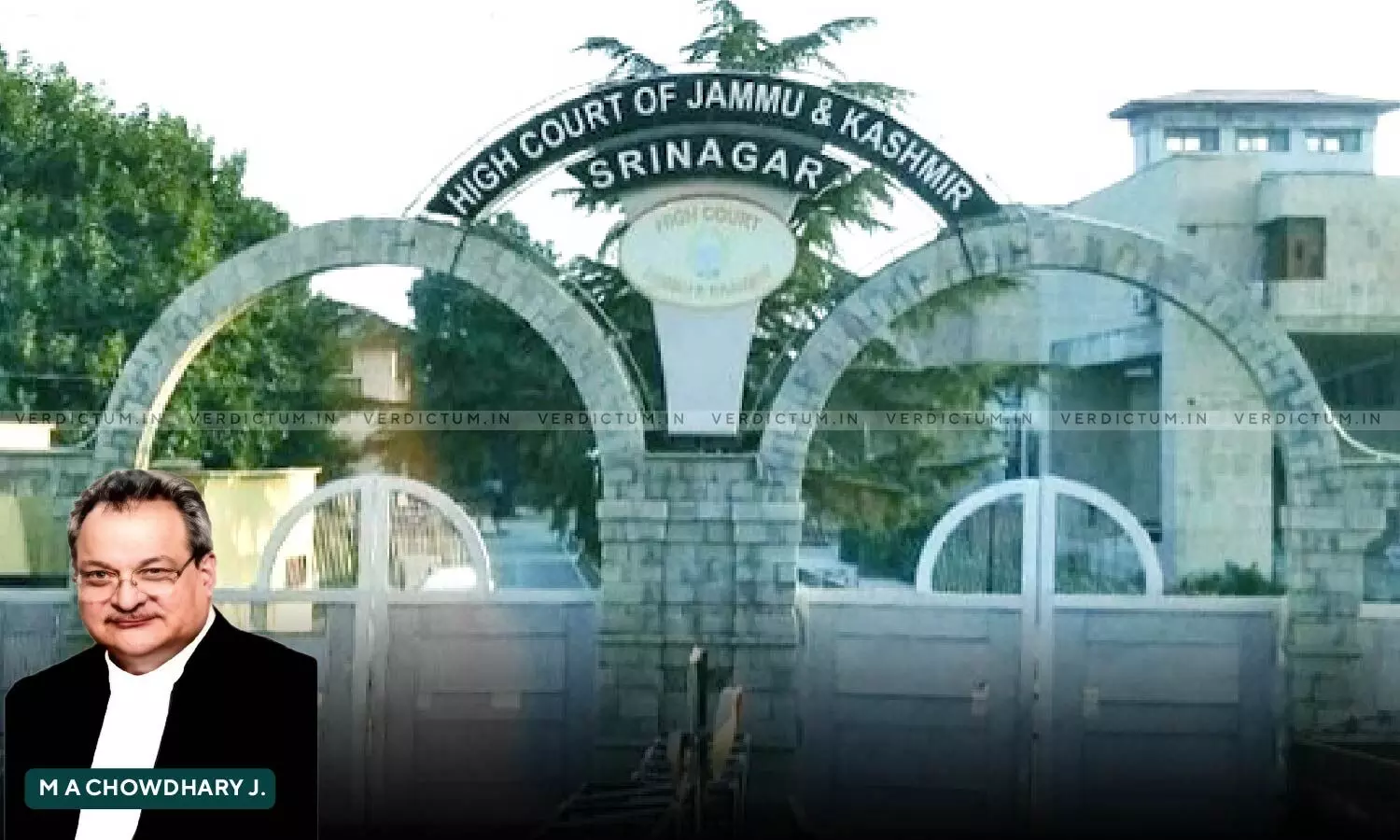
Justice M A Chowdhary, Jammu & Kashmir and Ladakh High Court
To Justify Preventive Detention Impact Of Offence Not Number Of Offences To Be Considered: Jammu & Kashmir And Ladakh High Court
 |
|The Jammu & Kashmir And Ladakh High Court was considering a Petition challenging the detention order under Section 3 of the Prevention of Illicit Traffic in Narcotic Drugs and Psychotropic Substance Act 1988.
The Jammu & Kashmir and Ladakh High Court has held that it is not the number of acts that are to be determined for preventive detention of an individual but it is impact of the act which is material and determinative.
The Court was considering a Petition challenging the detention order under Section 3 of the Prevention of Illicit Traffic in Narcotic Drugs and Psychotropic Substance Act 1988.
The single judge bench of Justice MA Chowdhary observed, "In view of the foregoing discussion, it is clearly disclosed that it is not the number of acts that are to be determined for detention of an individual but it is impact of the act which is material and determinative. In the instant case the act of detenue relates to drug trafficking, which has posed serious threat, apart from health and welfare of the people, to youth, most particularly unemployed youth, to indulge in such acts, ramifications thereof would be irreversible and unimaginable. Petitioner has not been able to convincingly point out violation of any statutory or constitutional provisions."
The Petitioner was represented by Advocate Idrees Saleem Dar while the Respondent was represented by Senior Additional Advocate General Monika Kohli.
Facts of the Case
The impugned detention order was challenged being in breach of the provisions of Article 22(5) of the Constitution of India read with provisions of PIT NDPS Act, asserting therein that the detention order so passed against the Petitioner is illegal and arbitrary as the translated version of documents was not communicated to the detenue, which vitiates the impugned detention order; that the representation filed on behalf of the detenue was not considered; that in all the 5 FIRs lodged against the detenue, he is on bail in all the cases; that earlier also, detenue was detained under PIT NDPS Act on the basis of 9 FIRs, and this time, earlier 4 FIRs are again made basis for passing the impugned detention order; that the detaining authority has not mentioned a word in the detention order with regard to the satisfaction drawn by it as to how it has come to the conclusion of passing the detention order.
Furthermore, it was stated that the Petitioner has not committed any offence nor he was involved in the commission of any offence under the NDPS Act which pose a serious threat to the health and welfare of the people, but the detaining authority without the application of mind and without considering the material on record had issued and passed the impugned detention order, which is illegal, unjustified, unwarranted under law.
It was also submitted that the order of detention and the connected documents annexed with the petition clearly show violation of the right of the detenue guaranteed in terms of Article 22(5) of the Constitution of India and the provisions of the PIT NDPS Act.
On the other hand, the Respondents, in the affidavit, stated that the detenue is a habitual drug peddler involved in possession and transportation of Narcotic Drugs and Psychotropic Substances and that, had he been let free, there would have been every likelihood of his re-indulging in criminal activities.
Reasoning By Court
The Court at the outset stressed that the right of personal liberty is the most precious right guaranteed under the Constitution, as it has been held to be transcendental, inalienable and available to a person.
"A person is not to be deprived of his/her personal liberty except in accordance with procedures established under law and the procedure as laid down in Maneka Gandhi v. Union of India (1978 AIR SC 597), is to be just and fair. The personal liberty may be curtailed, where a person faces a criminal charge or has been convicted of an offence and sentenced to imprisonment. Where a person is facing trial on a criminal charge and is temporarily deprived of his/her personal liberty because of the criminal charge framed against him/her, has an opportunity to defend himself/herself and to be acquitted of the charges in case the prosecution fails to bring home his/her guilt. Where such a person is convicted of the offence, he/she still has the satisfaction of having been given adequate opportunity to contest the charge and also adduce evidence in his/her defence", the Court observed.
Noting that the detenue had on earlier occasion also been taken into preventive detention, the Court concluded that the detenue is a habitual recidivist. Emphasizing that the detenue is involved in serious offence of illicit trafficking of narcotic drugs and psychotropic substances which has a larger impact on society, the Court upheld the detention order.
"The instant case relates to illicit trafficking of narcotic drugs and psychotropic substances. The drug problem is a serious threat to public health, economy and growth of humanity. Our global community is facing serious consequences of drug abuse and it undermines the socio- economic and political stability and sustainable development. Besides, it also distorts the health and fabric of the society and it is considered to be the originator for petty offences as well as heinous crimes like smuggling of arms & ammunition and money laundering.....", the Court observed.
The Petition was accordingly dismissed.
Cause Title: Mohd. Shakoor vs. Union Territory of J&K
Click here to read/ download Order